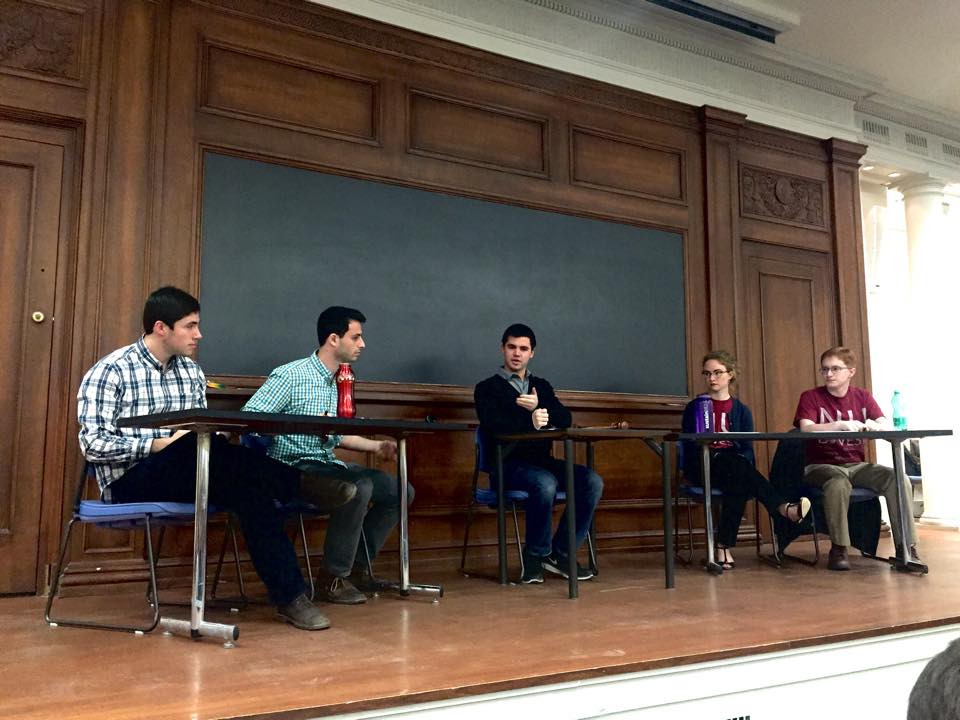
Photo by Zahra Haider / North by Northwestern
By 8 p.m. on Monday night, the auditorium in Harris Hall was packed.
Students were sitting on the floor, in the aisles and standing off to the sides of the room. There wasn’t an empty seat in the room during Northwestern University Political Union's (NUPU) panel discussion that Monday night where NU Divest and its opposing campaign Northwestern Coalition for Peace met in public for the first time.
When campaigns such as these engage in discussions online — whether through social media or even letters to the editor — the “discussion with distance becomes vitriolic,” said Weinberg junior and co-President of NUPU Alexi Stocker. “We wanted to bring both sides together to respond to each other,” he said.
Weinberg junior Noah Whinston and senior Moira Geary represented NU Divest. Weinberg junior Jonathan Kamel and senior Josh Boxerman represented NU Coalition for Peace. Kamel and Boxerman were also representing Wildcats for Israel and J Street U Northwestern, respectively.
Whinston introduced NU Divest as a grassroots movement asking the University’s administration to divest from companies such as Boeing and Lockheed Martin, both of which are weapons manufacturers, as well as Caterpillar, which manufactured the bulldozers that were used to tear down Palestinian homes in the West Bank.
“As students who are meant to have a moral grounding in the realm of international affairs, we feel that it is the least Northwestern can do to end its complicity and to end our complicity as students in the occupation,” he said.
Following that, Kamel presented NU Coalition for Peace's movement, which advocates for a two-state solution in the Israeli-Palestinian conflict.
“We stand against [the BDS movement]. We reject efforts which assign absolute blame to the Palestinians or Israelis,” he said. “We desire to be part of the solution for peace, not part of the problem which we believe the divestment movement is.”
Kamel characterized the divestment movement as largely symbolic on campus. Both he and Boxerman questioned the effectiveness of the campus divestment movement in ending the occupation.
“If ASG adopts the resolution [proposed by NU Divest], and we divest from Caterpillar, and then the board of trustees adopts it, and every institution in the country adopts it and Caterpillar decides to stop selling bulldozers to the Israeli military, will that end the occupation?” Boxerman asked the crowd.
“The answer is no,” he said.
Whinston conceded during a rebuttal that the impact would be symbolic.
“But that doesn’t mean it’s not worth doing,” he said. “Human rights cannot become something we have a massive debate over.”
In a follow up, Geary pointed to historical examples of divestment movements’ impacts, including the movement to divest from South Africa.
The discussion continued for about an hour. Kamel and Boxerman repeatedly criticized NU Divest and the broader BDS movement for being an obstacle in a two-state solution, which NU Coalition for Peace maintains is the only viable solution for peace in the region.
“[Divestment] is a chance for us to wash our hands of these corporations,” Boxerman said. “To be honest, that to me is the most appealing part of the process. I have no interest in standing here and defending Lockheed Martin. But making activism about us is not the way to go.”
Boxerman argued that it would be more effective to end human rights violations in occupied Palestine by ending the occupation itself.
“We can use our situation as students to take a productive step forward,” he said, and went on to discuss the efforts Northwestern’s J-Street has taken to pressure politicians in Washington, D.C., to advocate for a two-state solutions.
Meanwhile, Geary and Whinston were also critical of NU Coalition for Peace’s motives.
Whinston called the Coalition “an anti-campaign” and “reactionary,” noting that the group was created 24 hours after the launch of NU Divest.
Whinston and Geary focused on NU Divest’s goals relating to human rights, and they stated that the campaign does not endorse any political solution.
“BDS is not an organization,” Geary said. “Hypothetically, you could have people pushing for divestment who agree with one state or two state, but that’s not our thing. We’re not into determining for other people what their state should look like,” she said.
NU Divest has arranged many events in the past few weeks, but NU Coalition for Peace has not followed suit until recently.The group will host an event on Tuesday, titled “Peace is Progressive,” making its case against the BDS movement.
Although the panel debate on stage highlighted the myriad differences between the two campaigns, both campaigns agreed that dialogue is an important first step towards meaningful action.
“The turnout was really good tonight,” said Lucero Sugundo, a Weinberg senior involved with NU Divest, “but I hope people do their own research on both sides.”